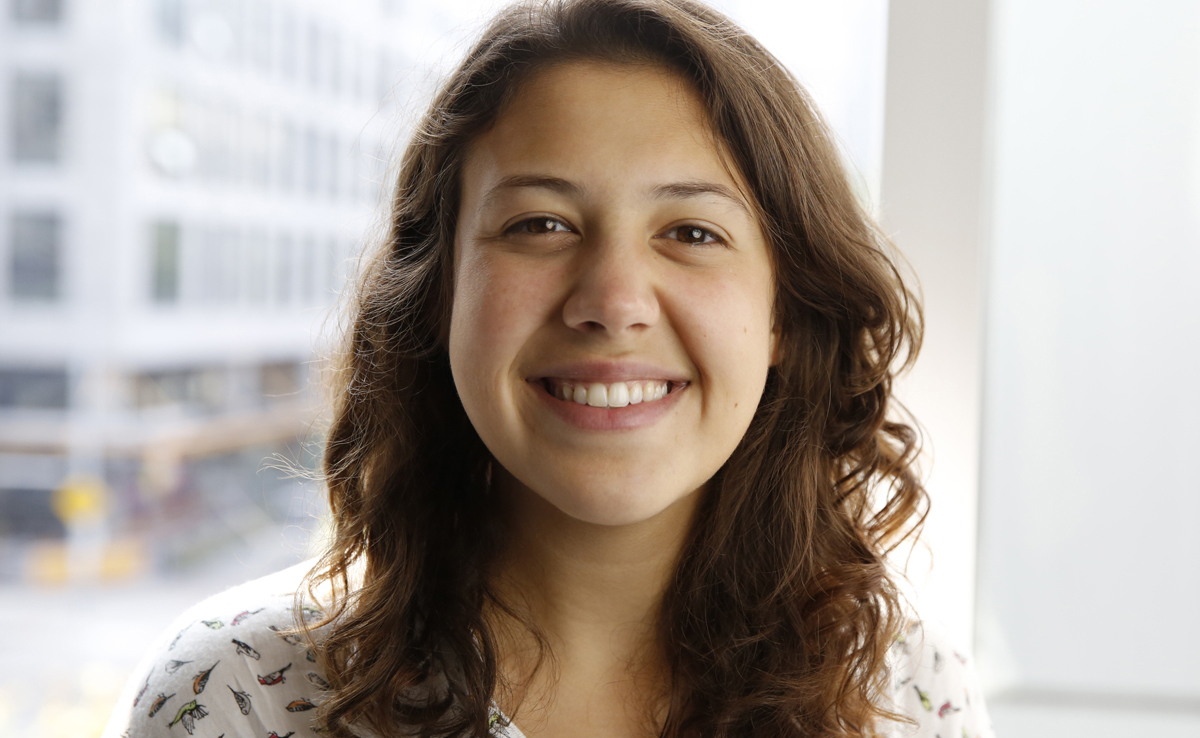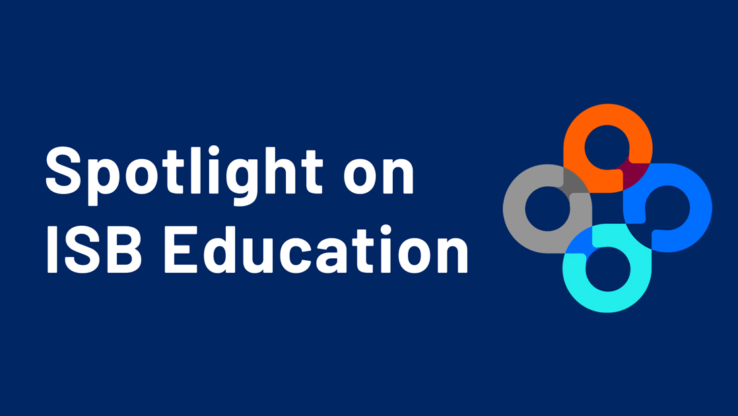Spotlight on Amy Zamora, ISB Systems Research Scholar
 isbscience.org/news/2019/01/15/spotlight-on-amy-zamora-isb-systems-research-scholar/
isbscience.org/news/2019/01/15/spotlight-on-amy-zamora-isb-systems-research-scholar/
Amy Zamora joined ISB in August as a Systems Research Scholar.
The Systems Research Scholars Program (SRSP) is a two-year program that provides recent college undergraduates a springboard to become the next generation’s pioneers of interdisciplinary scientific research. The fully funded SRSP provides scholars mentorship by ISB faculty and immersion in the scientific research of ISB.
In this Q&A, Zamora describes her experiences at ISB, research interests, future aspirations, and much more.
ISB: How has your experience as a Systems Research Scholar at ISB been so far? What have you learned through your collaborations with Dr. Nitin Baliga and members of the Baliga Lab?
Amy Zamora: I have had an amazing experience at ISB so far. Coming into the SRSP, I was intimidated by the idea of working with peers who have significantly more research experience than I do as a recent college graduate. Despite this feeling, I was welcomed by the Baliga Lab with such enthusiasm. It made me feel right at home. They are all so excited to see how much I can and will learn through this program. They have given me a supportive environment to flourish. This environment definitely fits the collaborative attitude present throughout all of ISB, and provides me with many resources to turn to when I need guidance or simply do not have enough knowledge base to understand a particular concept.
In working with the Baliga Lab, I have first and foremost learned that this program is truly designed to challenge me in a similar way graduate school would. I have been pushed to think more critically and have been given chances to make decisions I would have had no control over in undergrad. In addition to the wide knowledge base I’ve gained about Mycobacterium tuberculosis — the bacterium that causes tuberculosis (TB) in humans — and TB in general, I’ve gained a sense of independence, allowing me to learn how to be a better scientist and develop enough tools and understanding to design my own projects. Similarly, in working with the lab, I have learned how to better plan and execute my ideas and experiments, preparing me to eventually write my first first-author publication at the end of my time at ISB.
ISB: What projects are you working on?
Zamora: I am currently working with the TB group within the Baliga Lab, specifically focusing on antibiotic tolerance. Antibiotic tolerance, or the ability of bacteria to survive transient exposure to high concentrations of antibiotics without adjusting their antibiotic susceptibility, is a major cause of recalcitrant infections in TB cases. Despite this global issue, there is still very little knowledge of the mechanisms behind the process of obtaining tolerance in addition to its potential relationship with antibiotic resistance in TB. Knowing this, I am working to evolve antibiotic tolerance in Mycobacterium tuberculosis and observe the genotypic changes which occur as the bacteria adapt to survive drug exposure during evolution, eventually on the road to antibiotic resistance. Through such knowledge, the long-term goal is to be able to apply this evolution technique in a more focused manner across different lineages of TB, which are present in various regions of the world. This will ultimately provide insight into potential patient and strain-specific drug targets, which will minimize the adaptation of both antibiotic tolerance and resistance in TB.
ISB: You obtained a bachelor’s degree in Mathematics at Haverford College with a focus on applied mathematics. How would you describe your undergraduate studies compared to your SRSP appointment here at ISB?
Zamora: Despite my math-heavy background, my undergraduate career was filled with many opportunities to work in biology research with no computational aspects. After working at Haverford, Penn, and The Broad Institute, I realized that I had a greater desire to combine both mathematics and computer science into my interest in biological research. My math background at Haverford set me up well to fit into a more computational biology niche, allowing me to search for positions that would allow for the incorporation of both my wet lab and computational skill sets. This led me to find the SRSP program at ISB.
Comparatively, my work at ISB is more interdisciplinary than anything I was exposed to in my undergraduate work. It offers me the opportunity to perform experimental research with a computational component where I can analyze my own data, uncover the biological implications of the data, and translate it into results which are meaningful. With this, I feel that the work I’m doing at ISB feels more put together and complete. Every aspect of the work I’m doing — the experiments, the analysis, the modeling, etc. — is passing through my hands at some point, allowing me to have a better grasp on both the greater implications of my work as well as the rigor which it takes to perform good, higher level science.
ISB: How do you explain what you do to people in your life without a science background?
Zamora: This is something I’ve had trouble with for a long time and don’t think I’ve fully mastered just yet. Typically, I start by putting my research into a global perspective and talking about what the problems are that need to be solved. I’ve found that if I can give people a context for why the research is important, it’s easier for them to understand. From there, I try to explain it in a broader sense. How are my experiments helping to solve big, well-known, global problems? What opportunities does my research open up for questions? I find that if I start with the nitty gritty details, people lose interest because they don’t really know what I’m talking about.
ISB: What are your plans following this two-year scholarship?
Zamora: I plan to attend graduate school with the goal of obtaining a PhD — however in what and where I don’t yet know. I plan to use this opportunity at ISB to come to a conclusion about what type of research I enjoy and am interested by: either more computational work or more experimental work. This decision will impact which graduate schools and programs I will look to apply to in the fall.
ISB: Where do you see yourself in 10 years?
Zamora: In 10 years, I plan to be in the early stages of my postdoc, finished with graduate school! Hopefully at this point I will be well on my way to figuring out whether or not I want to work toward having my own lab or be a senior research scientist.
ISB: What do you do when you’re not at ISB? Any hobbies, passions, interests?
Zamora: I am very passionate about running and working out! I run 5-6 days a week and am currently training for the Vancouver Half Marathon in May. I am also a member of a free fitness organization called November Project which meets at Gasworks Park for morning circuit, body weight workouts twice a week. It’s a great organization and wonderful community to belong to, especially as someone new to Seattle and the Pacific Northwest. Through them, I have picked up a new passion for trail running as well! Additionally, I am trying to get back into reading after a fairly long hiatus from reading for pleasure in undergrad. I have finished four books so far in my time here, and I’m hoping to increase that number as I learn to manage my time.
ISB: What is the last book you read?
Zamora: I last read the fiction novel “Americanah” by Chimamanda Ngozi Adiche, which is a somewhat autobiographical tale of race and identity in the United States through the lens of a foreigner looking for opportunities of success. I found myself drawn to this book because it carries out a larger conversation about the nuances of race within the black community of the United States. After attending a small liberal arts college, I find myself seeking out conversations such as this to better understand the social dynamics of the country I live in rather than projecting my own world views onto others.
ISB: Any hidden skills you’d like to share?
Zamora: I thought about pursuing art after high school because I was a talented photographer and painter. I took mostly art courses in high school (I took every one available — including AP Studio Art) and had a portfolio set up in case I decided art was the right path for me. I still draw from time to time, and like to think I maintained some of my skills.
ISB: Anything you’d like to add?
Zamora: I’m so excited to be here at ISB and look forward to learning as much as I can from those around me! If you see me around, say “hello!” I’d love to chat.




